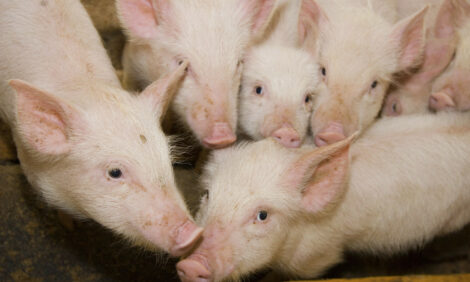



Save 340 million, Pig Producers Told
YORKSHIRE - Faced with higher costs due to the escalating price of feed, the British pig industry could save over 340 million per year, simply by improving feed conversion by 0.1. This represents 267,000 tonnes of feed at an average price of 3150 per tonne on the 8.9 million pigs finished annually, Stephen Curtis told farmers attending a conference organised by ACMC Ltd, at Beeford, Yorkshire.
Disease, he said, had the biggest impact on margins and he questioned how many of the diseases, such as FMD, PRRS, and *, which had nearly broken the back of the British industry, actually originated in the UK. "Before joining the EU any 'germ plasm' coming into our island had to go through strict quarantine. Since joining we have, through the help of our government, helped our competitors generously by opening our doors to imported semen and live animals with almost no controls.
"The two latest viruses PRRS and PMWS have caused death, poor performance and high drug costs while foot-and-mouth disease and swine fever prevented pigmeat exports for extended periods, thus reducing farm gate prices."
But Mr Curtis said that improved genetics could go a long way to reducing costs. An improvement in feed conversion of 0.1 was worth £1.65 on an 80kg deadweight pig.
He said that in the last five years ACMC had improved output by 0.8 pigs per litter, reduced feed conversion by 0.16, improved daily gain by 60g and lean meat by 0.9 per cent. The improvement in growth, feed conversion and lean were worth, respectively, £4.29 per pig, £3.13 per pig and £0.58 per pig while the extra pigs produced reduced the cost per sow by £88.
"Putting this all together and assuming 22 pigs reared per sow per year the total value of the improvement amounts to £264 per sow per year," he said.
Mr Curtis predicted further consolidation within the British pig industry, whether through integration or simply through fewer pig producers becoming larger operators. However, fewer producers wouldn't necessarily mean fewer pig units.
"Constraints through IPPC and inevitable further legislation will continue to restrict unit size, therefore placing pressure on the ways pig units can expand." *FMD foot-and-mouth disease; PRRS, porcine reproductive and respiratory syndrome; PMWS post-weaning multi-systemic wasting syndrome.
Supermarket support needed

A call for British retailers and food service companies to recognise the challenges facing the UK pig industry, and to support it, was made by BPEX chief executive, Mick Sloyan.
"This is not because the British industry is looking for preferential treatment, but because it is what consumers demand," he said.
"Over two-thirds of the pork and bacon products imported into the UK would be illegal to produce here on the grounds of welfare," he explained. This was confirmed by a survey involving a large sample of consumers. More than 90 per cent said they were 'concerned' or 'very concerned' that this was the case. They felt that all pork should be produced to UK welfare standards and not be imported if it did not meet UK legislative standards.
Mr Sloyan pointed out that the vast majority of all pork and pork products eaten in the UK was sold through retail outlets, with supermarkets being dominant. A large amount had recently been sold under tertiary brands where some major retailers have declared specifications for own brand products, but state they have no control over tertiary brands, despite the fact that they are being packed by the same suppliers in many cases!
However, the number of pigs produced in supplying countries under the so-called 'UK contracts' had fallen, despite price premiums being paid to producers in those countries. "The reason stated is an apparent lack of demand from UK retail and food service buyers!" said Mr Sloyan
Apart from Italy - with its specialists Parma ham trade - at over 100 p per kg, Britain still had the highest production costs within the EU, so it was vital to secure the premium market. Retailers benefited from big differentials for premium products on their shelves.
Growing British pigmeat sales

Chris Blundell, corporate affairs director for Morrisons, the supermarket chain, outlined his commitment to the British pig industry. As the fourth largest retailer with 369 stores throughout the UK, it has over 10 million customers a week and an 11.1 per cent share of the GB food markets.
He said that the company understood food, knew where it came from and were close to farmers. The company supported British agriculture and 95 per cent of the fresh pork sold was British. He pointed out that Morrisons was the only major food retailer with a long-term commitment to own and operate their own fresh food manufacturing plant, including meat processing.
Morrisons were currently slaughtering over 7,000 pigs a week at Colne in Lancashire from pigs of up to 82kg, deadweight, and this would increase when their abattoir - currently being refurbished at Spalding in Lincolnshire - came on stream. Due to open early in 2008, it could potentially process 350 pigs per hour, producing fresh pork, cured and processed products. Initial weekly throughput would be 4,500 pigs a week and this was expected to increase to 9,000 pigs a week after two years.
This would give full control over the supply chain and result in efficiencies to compete with the larger retailers and also offer greater transparency, said Mr Blundell.
The aim was to grow pork sales and Morrisons were already selling a larger range of pork cuts than any of their competitors, he said.








